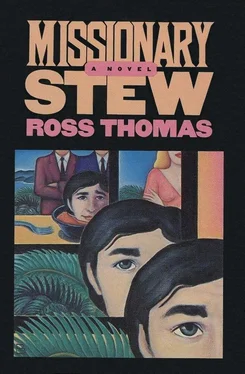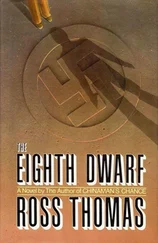Ross Thomas - Missionary Stew
Здесь есть возможность читать онлайн «Ross Thomas - Missionary Stew» весь текст электронной книги совершенно бесплатно (целиком полную версию без сокращений). В некоторых случаях можно слушать аудио, скачать через торрент в формате fb2 и присутствует краткое содержание. Город: New York, Год выпуска: 1983, ISBN: 1983, Издательство: Simon & Schuster, Жанр: Политический детектив, на английском языке. Описание произведения, (предисловие) а так же отзывы посетителей доступны на портале библиотеки ЛибКат.
- Название:Missionary Stew
- Автор:
- Издательство:Simon & Schuster
- Жанр:
- Год:1983
- Город:New York
- ISBN:978-0-671-49363-9
- Рейтинг книги:3 / 5. Голосов: 1
-
Избранное:Добавить в избранное
- Отзывы:
-
Ваша оценка:
- 60
- 1
- 2
- 3
- 4
- 5
Missionary Stew: краткое содержание, описание и аннотация
Предлагаем к чтению аннотацию, описание, краткое содержание или предисловие (зависит от того, что написал сам автор книги «Missionary Stew»). Если вы не нашли необходимую информацию о книге — напишите в комментариях, мы постараемся отыскать её.
Missionary Stew — читать онлайн бесплатно полную книгу (весь текст) целиком
Ниже представлен текст книги, разбитый по страницам. Система сохранения места последней прочитанной страницы, позволяет с удобством читать онлайн бесплатно книгу «Missionary Stew», без необходимости каждый раз заново искать на чём Вы остановились. Поставьте закладку, и сможете в любой момент перейти на страницу, на которой закончили чтение.
Интервал:
Закладка:
Haere lied as a matter of course. “No.”
Yarn nodded, as if that were the answer he had expected. “Tell us a little about yourself, Mr. Haere, what it is you do.”
“You’re serious?”
Again, Yarn nodded.
“Well,” Haere said, “I try to shape the events that alter and illuminate our lives.”
“Politics.”
“Politics,” Haere agreed.
“But you’re not a politician?”
“I’m more of a shadowy figure who moves behind the scenes, a faceless manipulator grasping at the levers of power. If you want more, there’s a fat FBI file on me nearly four inches thick that goes back almost thirty years to when I was a kid.”
“We know,” Yarn said. “It’s been coming in over the telex all evening.”
“So long, pussy,” Tighe said as he gently dumped Hubert to the floor, rose, and gave Haere’s enormous room another curious glance. “Much money in politics?”
“Not if you’re halfway honest.”
Still looking around, Tighe nodded as if what he saw spoke of total probity as well as dubious taste. Yarn was also up now, and they both moved toward the door after thanking Haere for his cooperation. When they reached the door, Yarn turned.
“About Mr. Meade,” he said.
“What about him?”
“He seems to have disappeared.”
“Vanished,” Tighe said.
“Into the usual thin air, I suppose,” Haere said.
Yarn nodded. “Where else?”
“Well,” Haere said and for some reason looked down at his bandaged hands. Tighe noticed.
“They still hurt?” he asked.
“No,” Haere said, “not much.”
After they had gone, Draper Haere stood by the door, still staring down at his bandaged hands. He then turned, crossed to the phone, looked at his watch, picked up the phone, and dialed the number of Baldwin Veatch, the governor-elect.
Chapter 7
They met for breakfast the next morning at 7:30, the three of them: Draper Haere, Baldwin Veatch, and his wife, the former Louise Guidry of Crowley, Louisiana, where in 1967 at age eighteen she had been crowned queen of the annual rice festival. Two years later at Berkeley she had been one of the firebrands leading the march on People’s Park. After being graduated in 1972, she had gone to work in Sacramento for Baldwin Veatch, then a newly elected state senator. They were married later that same year. In the fall of 1973 she and Draper Haere had begun their long, hopeless, and often acrimonious affair.
Louise Veatch sipped tea and her husband black coffee in the booth at Kenny’s delicatessen-restaurant on Wilshire Boulevard in Santa Monica. Across from them, Draper Haere mopped up the last of his two fried eggs with a piece of rye toast. Two booths away sat a pair of state policemen who were the governor-elect’s bodyguards. Both were in their late twenties and neither ever drank anything stronger than orange juice.
Draper Haere liked working breakfasts because he had found that most people were not at their best in the morning. It sometimes proved to be a slight, useful edge. He also liked Kenny’s for its eavesdropping. Haere was particularly fond of psychobabble, and there was a lot of it at Kenny’s after 10:00 at night when the evening group-therapy sessions let out.
“They want it then — whatever Replogle had,” Veatch said.
“Who?”
“The FBI.”
“I think they’ve already got what he had,” Haere said. “What I suspect they’re trying to do is put the lid back on and make sure nobody else gets it.”
Louise Veatch looked at her husband. “Draper’s right.”
Veatch nodded. “Perhaps.”
“The question is,” Haere said, “what do you want to do about it?”
The Veatches continued to stare at each other. They were an unusual political couple, Haere often thought, even remarkable. Louise Veatch had kept all of her beauty-queen looks: still a blue-eyed, black-haired Cajun lovely with a touch of the wild about her. Veatch himself was a tall lean angular blond with calculating gray eyes, a disarming, lopsided grin, and the perfect political personality that all its life had struck up conversations with strangers at bus stops. She was the smarter of the two, Haere felt, but Veatch was the wilier. Their ambition was evenly matched in that it was limitless. She often brooded, but he went to bed optimistic and woke up feeling even better. She had unassailable convictions, while her husband had to make do with mere principles. They were colleagues, even friends, but rarely lovers. Sex to Baldwin Veatch was an occasional afterthought. To Louise Veatch it was a primary reason for living, which is why she so long ago had jumped into Draper Haere’s bed.
Haere had never once even bothered to ask Louise Veatch to leave her husband. It wasn’t that Haere didn’t love her. He did so desperately. Sometimes when they had been separated for a month or so, he would enter a room where she was and something strange happened to him. Something adolescent. He temporarily lost the power of speech. He had minor palpitations. He sweated. He suspected that he even blushed, although no one had ever said anything. But all Draper Haere had to offer Louise Veatch was love, politics, and a room over the store. If Louise Veatch had to live over the store, he realized she would just as soon do it in the White House.
The Veatches were still staring at each other, engaged in some kind of wordless communication, when Louise Veatch finally turned to Haere and said, “Okay. Let’s do it.”
Haere nodded. “All right.”
“Can you handle it?” Veatch asked.
Haere shook his head slowly. “I don’t know how.”
“Who would?”
“A trained investigator, maybe a smart reporter, someone like that.”
Veatch frowned, obviously running a list of unacceptable candidates through his mind. “We don’t want to share this though, do we?”
“No.”
“Anyone in mind?”
“Not offhand,” Haere said.
Louise Veatch turned to her husband. “Give me some change.”
“Who’re you going to call?” he said, digging into a pants pocket.
“Craigie Grey. If somebody like we’re looking for’s around, she’ll know. Craigie knows everything.”
Veatch rose to let his wife out. “Just don’t tip her off about—”
Louise Veatch interrupted him. “Baldy. Have I ever?”
“No,” he said. “Of course not. Never.”
The two men watched Louise Veatch head for the pay phone in what a feature writer had once called “a rhythmic slither.” They turned back to look at each other, and again Haere wondered if Baldwin Veatch knew he was being cuckolded. And as always, Haere came up with the same answer: Probably, but he doesn’t really care as long as it’s discreet. Better me than someone else.
“How was he?” Veatch said. “Replogle.”
“I guess you’d have to say he was cheerfully resigned. The pain was getting to him.”
“You two went back a long way, didn’t you?”
“Ever since I was a kid. He and my old man were good friends. When they went after him for being a red back in ’fifty-two, Jack was about the only one who stuck with him. He was like that. Jack, I mean.”
“You know,” Veatch said, “I could never understand all this nostalgia for the fifties. Talk about a low and dishonest decade.”
“I think it was Gable mostly.”
“Clark Gable?”
“Right,” Haere said. “If you closed your eyes when Eisenhower talked, he sounded exactly like Clark Gable. That must have been awfully reassuring to most people.”
They both looked up when Louise Veatch returned to the table wearing a pleased smile. Veatch rose to let her in. She slid into the booth, looked at both men, said, “Morgan Citron,” and waited for their reaction.
Читать дальшеИнтервал:
Закладка:
Похожие книги на «Missionary Stew»
Представляем Вашему вниманию похожие книги на «Missionary Stew» списком для выбора. Мы отобрали схожую по названию и смыслу литературу в надежде предоставить читателям больше вариантов отыскать новые, интересные, ещё непрочитанные произведения.
Обсуждение, отзывы о книге «Missionary Stew» и просто собственные мнения читателей. Оставьте ваши комментарии, напишите, что Вы думаете о произведении, его смысле или главных героях. Укажите что конкретно понравилось, а что нет, и почему Вы так считаете.












